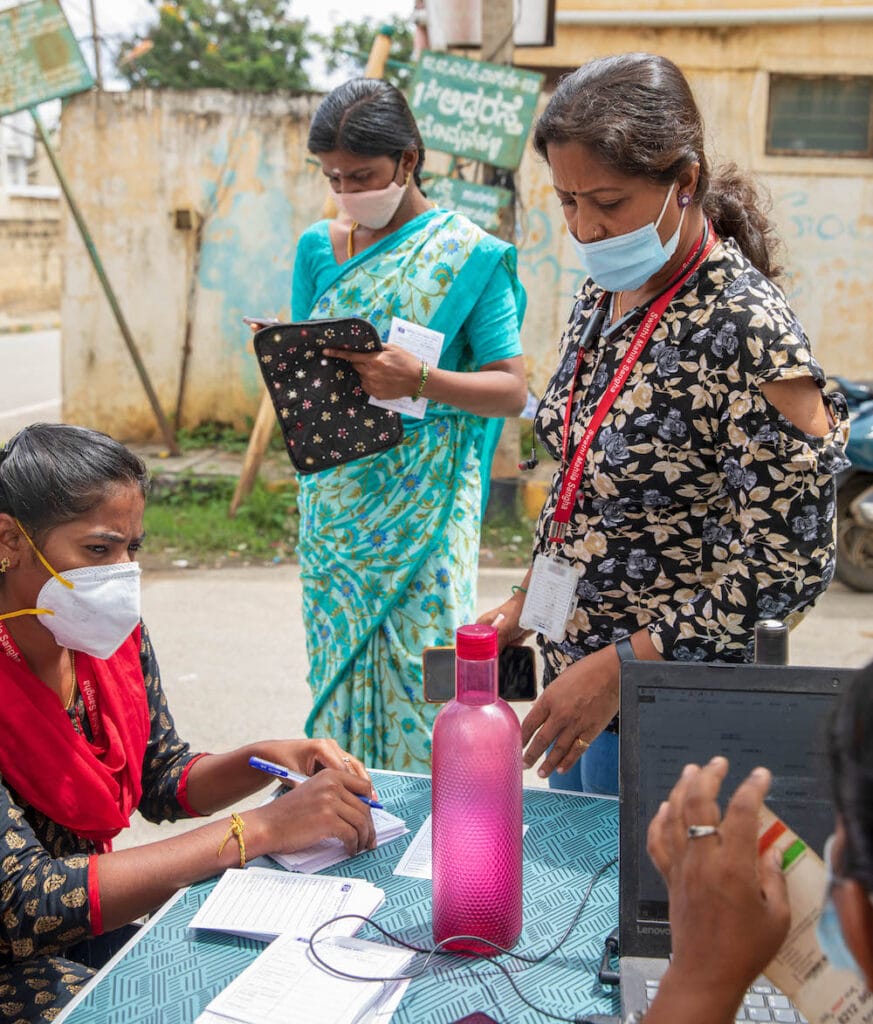Swathi Mahila Sangha (SMS), a community-based organisation, has been working for the empowerment of women sex workers since its inception in 2003. Part one of the series delved into the journey of the organisation helping marginalised women with essential services by providing them with healthcare, financial security, social protection.
This article will examine the legal challenges women sex workers face and the future plans of SMS to further strengthen the lives of women in sex work.
What are the challenges they face? What does the law say?
Despite progress made by India on various fronts, women in sex work continue to face unique and multidimensional challenges. Women in Sex Work (WSW) have been identified as one of the most discriminated and vulnerable populations in India.
They continue to struggle with their rights and recognition, face stigma, discrimination and abuse and have very limited platforms to raise their multidimensional issues. They experience intersecting forms of marginalisation and their vulnerabilities are exacerbated due to lack of access to social rights, education, livelihood opportunities and social protection.
The Immoral Traffic (Prevention) Act of 1956, which governs sex work, labels sex work as immoral, reinforcing societal bias against sex workers. Due to the criminalisation of their work, these women are at high risk of violence, including physical and sexual abuse. This violence is often perpetrated by clients, pimps, or law enforcement officers and it is challenging to report violence without fear of arrest.
The legal framework surrounding sex work in India is ambiguous. While the Immoral Traffic (Prevention) Act criminalises solicitation and brothel-keeping, it does not explicitly criminalise sex work itself. This legal ambiguity leads to inconsistent law enforcement practices, making sex workers susceptible to harassment and abuse. Women in sex work are often arrested and detained by law enforcement officers, leading to a cycle of exploitation within the criminal justice system. Their voices and perspectives are also often marginalised in policy development.
There is a need for policies that actively involve sex workers in decision-making processes and address their unique needs and concerns. Comprehensive data on the sex work industry in India is lacking. Policies should support data collection efforts to better understand the challenges faced by sex workers and develop targeted interventions.
In May 2022, the Supreme Court of India passed a historic judgement that recognised prostitution as a profession, adding that sex workers are entitled to dignity and equal protection under the law, and the police should not interfere or take any criminal action when an adult engages in consensual sex work. The judgement mentioned that sex workers and their children are covered by the protections of Article 21 of the Constitution of India like every other profession and person.

Read more: Multifaceted empowerment: How a community-based organisation supports women sex workers
The way forward
Since its inception in 2003, SMS has come a long way in improving the lives of sex workers across Bengaluru, and empowering them through numerous capacity-building initiatives.
The Pragati programme was launched in 2005 with financial support from the Bill and Melinda Gates Foundation, the Karnataka State AIDS Prevention Society (KSAPS) and Vrutti Livelihood Impact Partners, an NGO. SMS along with Swasti implemented the Pragati programme through the following initiatives – Swathi Jyothi, Swathi Chetana, Swathi Spoorthi, Swathi Savi, Swathi Nyaya Sanjeevini and Social Protection and Employment.
Going forward, adopting a community-centric and technology-driven approach, SMS plans to continue and accelerate its work for women in sex work and their community organisations, especially in areas of social protection, healthcare access, financial security, community institutional building etc. For example, Swathi Jyoti offers a range of services, including health services focused on preventive and promotive health, financial services that start with financial literacy and management programmes, and well-being services that encompass social protection assistance, gender-based violence prevention, life skills programmes, and livelihood generation opportunities.
Governance and management are overseen by an independent board established in October 2007, with technical support provided by partners such as Vrutti, Swasti, and Catalyst Management Services. The Swati Jyoti programme has been awarded the ‘Best Co-operative of the Year-2012’ for women empowerment by the Karnataka Federal Co-operative, the “Best Urban Micro Enterprises” award in 2012 by CITI Foundation, and recognised for excellence in “Business Innovation and Social Impact” category in Start-up India funding challenge 2013. SMS is supported and guided by Taaras, which is a coalition of women in sex work and their community organisations in 5 states that provides a platform for their voices, aspirations and joint actions.
Swati Mahila Sangha contact details:
Email id: pushparsms@gmail.com
Website: https://swathimahilasangha.wordpress.com/